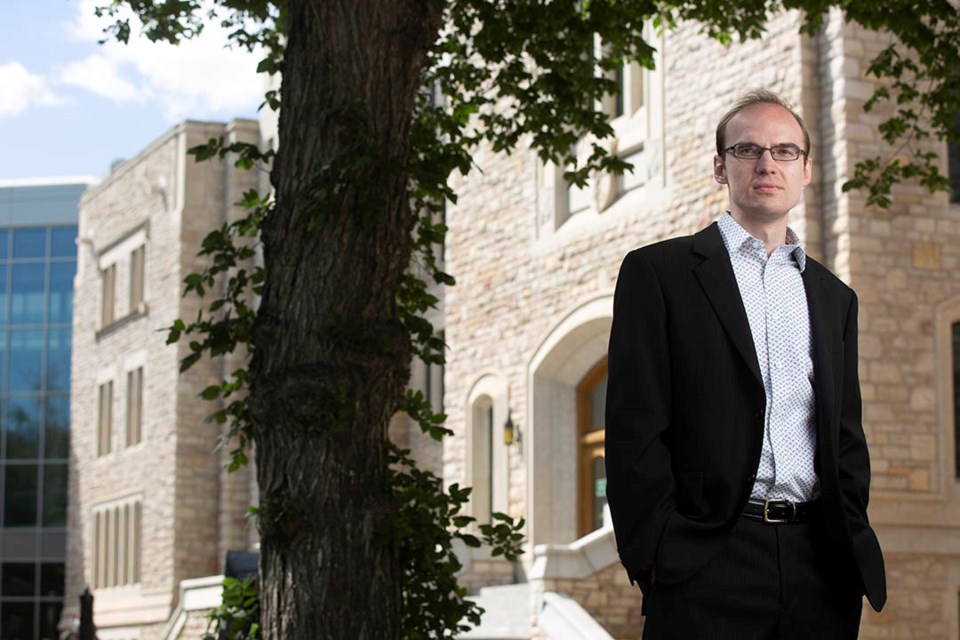SASKATOON – Dr. Scott Adams (MD, PhD) is creating artificial intelligence (AI) algorithms to more accurately identify people at risk of developing cardiovascular diseases.
The project, titled “Artificial intelligence CT-based biological age as a novel predictor of cardiovascular and all-cause mortality,” received $150,000 as part of the Saskatchewan Health Research Foundation (SHRF) Establishment Grant program. The SHRF Establishment Grant is intended to support early-career researchers in creating health research programs with a focus on Saskatchewan health issues.
Adams, a cardiothoracic radiologist at Royal University Hospital (RUH) and an assistant professor in the University of Saskatchewan (USask) College of Medicine, said the SHRF grant will help jump-start a new program using machine learning to detect health risks for Saskatchewan residents.
“We’re developing an AI model for three types of imaging exams: chest X-rays, coronary artery calcium CT scans and lung cancer screening CTs. These are all exams that are commonly performed, but we’re not leveraging the data that are in those scans,” he said. “The goal of this project is to develop an AI model to better leverage these data to better predict cardiovascular disease."
Adams’ project is based on the concept of “biological age” against “chronological age.” Biological age is the idea that different individuals will age at different rates due to numerous factors including genetics, lifestyle choices, and chronic diseases or health issues. This variable aging means people will be at heightened risks of death at different times in their lives, regardless of the number of candles on their birthday cake.
Adams and his co-investigator Dr. Seok-Bum Ko (PhD) with the USask College of Engineering hope they can create an AI model using information from CT scans that can accurately gauge biological age.
That AI model can then be used to predict the risk profiles of patients who might otherwise never know they were in danger of cardiovascular disease until they have a potentially devastating heart attack or stroke.
“The goal of this project is to develop an AI model to better leverage these data to better predict cardiovascular disease,” Adams said. “If we don’t have an accurate risk profile for patients, we can’t offer them the medications and other preventive strategies that could be potentially helpful.”
Cardiovascular disease is considered one of the leading causes of death in Saskatchewan and the number one cause of death in Canada according to the World Health Organization.
As USask researchers continue to develop AI that can better discern those at risk for cardiovascular disease, Adams said the technology can hopefully be applied to screening for other prevalent medical conditions as well.
For Adams, the SHRF funding is only the start of what he hopes can be a long-lasting program at USask to continue developing the use of AI in health care.
“The grant is a catalyst for developing a world-class research program in Saskatchewan. I’m grateful for SHRF for investing in researchers at USask and across Saskatchewan,” he said. “There’s a tremendous amount of potential in this province, and I think Saskatchewan people are counting on USask to be doing research that improves the health of Saskatchewan residents.”
Cari McIlduff – Where Indigenous Peoples Lead, Health and Mental Health Follows – $150,000.00
Yifei Dong – Understanding the effect of natural aging on chronic injury found in progressive multiple sclerosis – $149,886.00
Stacey Lovo – Expanding Pediatric Rehabilitation in Northern First Nation Communities – $149,996.46
Jennifer Wachter – Identifying factors necessary for the survival and virulence of the Lyme disease bacterium – $131,258.16
Justin Botterill – Exploring hippocampal circuits that cause and prevent temporal lobe epilepsy –$150,000.00
Ernesto Figueiro Filho – Placental Growth Factor (PLGF) as a tool for Obstetrical Management of High Risk Pregnancies – $150,000.00
Asmahan AbuArish – Can Good Lipids Resolve Severe COVID-19 Symptoms? - $120,000.00
Peter Pioli – To Determine if Thymus Antibody-Secreting Cells are Autoimmune and Regulate T Cell Development - $120,000.00



